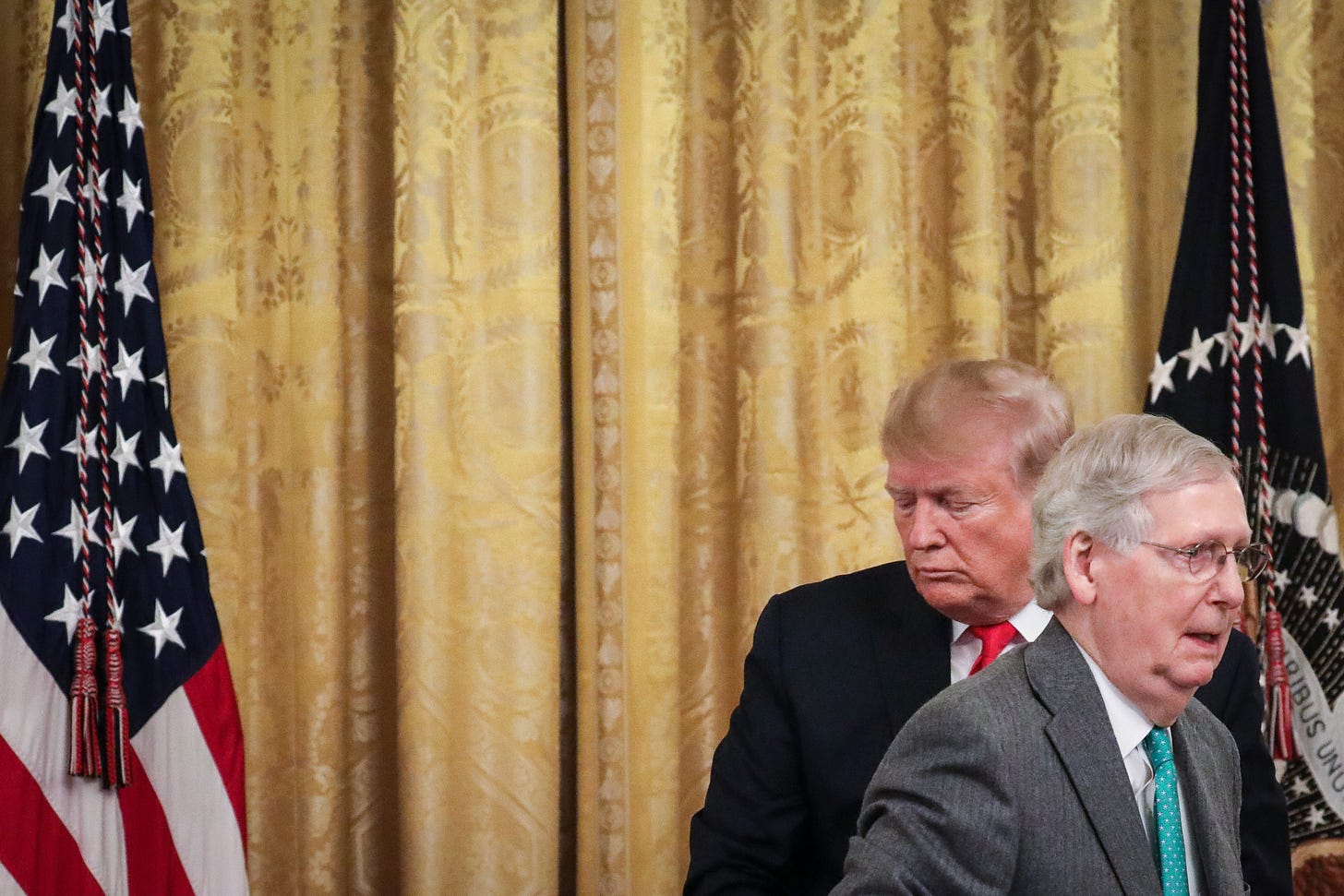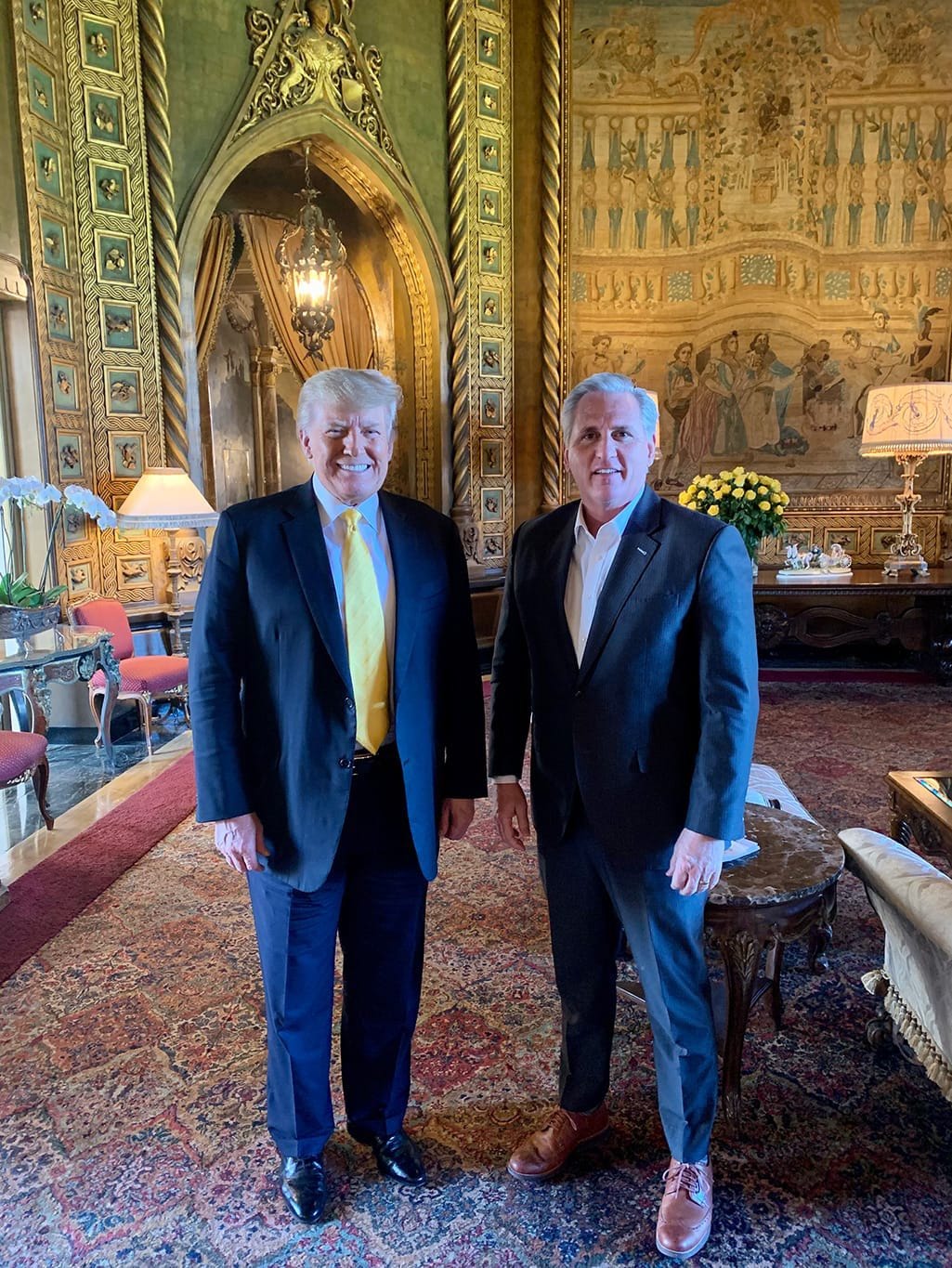The GOP's extremism problem predates Trump
And it will outlast him.
This free edition of PN is made possible by paid subscribers. If you aren’t one already, please click the button below to support our independent journalism.
There’s an old adage that politics has no tolerance for losers. But since 2016, the Republican Party has proven otherwise.
Whatever the outcome of the 2024 election, Donald Trump will have realized one unprecedented achievement: Maintaining control over one of the nation’s two major political parties despite a remarkably consistent record of leading the GOP into loss after loss.
The possibility that the nation’s democratic institutions could operate to send a candidate back to the White House who not only openly opposes democracy but also has a six year streak of electoral underperformance is a product of two realities. First, the United States’ political system has long vested near complete control of its democratic process solely to its two major political parties; and, second, one of those parties, the GOP, has now definitively surrendered itself to extremism.
As the repeated electoral losses of the Trump-led party demonstrates, the extremism that now dominates the GOP has never been widely popular with the American people. But the GOP long ago discarded the structural protections that allowed it to overcome a previous extremist takeover of the party in the wake of an electoral debacle.
Therefore, even if Trump loses in November, the GOP will almost certainly continue to be controlled by the same extremist factions, and the accompanying danger to the nation’s democratic system likely will remain ongoing and grave for the foreseeable future.
January 6 demonstrated Trump’s dominance of the GOP
In retrospect, Trump’s post-2022 comeback was already baked in on the day of his greatest political ignominy, January 6, 2021.
Weeks after the insurrection, Senate Republican leader Mitch McConnell, long vaunted as being among the GOP’s most savvy political strategists, appeared to be dismayed by Trump’s recent re-ascendance. After declaring Trump “practically and morally” responsible for the storming of the Capitol by his supporters — but refusing to vote for his impeachment — McConnell spent the next several years ignoring Trump, apparently believing that his influence would organically dissipate.
He was wrong. January 6 and its immediate aftermath actually demonstrated that the Republican Party’s infrastructure had ineluctably merged with the very same type of authoritarian impulses that powered the storming of the Capitol.
A note from Aaron: Working with brilliant contributors like David requires resources. To support our work, please become a paid subscribers if you aren’t one already.
While McConnell denied this reality, it was already becoming clear to then-freshman House member Peter Meijer on the evening of January 6, when he learned that most of his GOP colleagues planned to adhere to their previously stated plans to oppose the certification of the election in obeisance to Trump.
No less than two thirds of the House GOP caucus voted against certifying the election outcome in at least one state, including future Speaker Kevin McCarthy, who voted against certifying the electoral outcome in both Pennsylvania and Arizona. The person who would later succeed McCarthy as House speaker, Mike Johnson, not only voted the same way, but also organized much of the GOP caucus to support a wholly meritless legal challenge to the outcome of the election. Meijer later recounted that some of his colleagues justified their attempts to overturn the voters’ choice for president by saying that they feared for the lives of their families.
But a well-founded fear of political peril is the more cogent explanation for most Republican lawmakers’ decision to follow up an effort to undermine democracy in the Capitol by force with their own scheme to do so in the House chamber.
Although some were writing Trump’s political obituary, these legislators intuitively understood, even as the attackers were being cleared from the scene, that it would be politically untenable to break ranks with him. Put otherwise, as Trump himself (correctly) warned longtime GOP stalwart Mike Pence at the time, opposing Trump’s scheme to void the outcome of the election would be a political “career killer.”
After initially criticizing Trump’s action’s on January 6, McCarthy, whose primary skill is as a political weathervane, apparently became more convinced that his own burning desire to become speaker could only be satisfied if he bowed to Trump at the very moment he was being most reviled by the majority of Americans. So, on January 28, 2021, McCarthy flew to Mar-a-Lago for a grip-and-grin with Trump, and to hold discussions on what were described as plans for “taking back the House in 2022.”
McCarthy and the rest of the GOP’s leaders did, in fact, allow Trump to make himself the centerpiece the GOP’s midterm election campaign, which — like so many elections since 2016 — went badly for the Republicans. It therefore seemed initially puzzling that Trump was able to launch a successful campaign for the 2024 GOP presidential nomination in the immediate wake of that reminder of his singular ability to grab defeat out of the jaws of victory.
Yet the trajectory of Trump’s career since he was forced out of the White House only serves to demonstrate that his stranglehold over the GOP is less a product of his political skill, which (like his supposed business acumen) is often greatly overstated, than one of timing. In fact, a transformation of the GOP began well before Trump, a longtime Democrat, even joined the Republican Party.
As Susan Glasser recently observed in discussing Trump’s unchallenged leadership of the Republican Party with Greg Sargent, the extremist base, to which Trump exclusively panders, is a minority of a minority. By the time Trump appeared on the scene, the Republican Party’s political base had — over a period of decades — been distilled down to various factions adhering to right-wing ideologies grounded on racial and religious intolerance and a deep and abiding suspicion of democracy. The prevalence of these ideologies in the base of the Republican Party only intensified as the nation became less predominantly white and culturally conservative.
How extremists took control
This is not the first era in which the Republican Party was taken over by the extremist fringe.
In 1964, Barry Goldwater led a takeover of the GOP by a coalition of pro-segregationist southerners, libertarian business owners, and anti-communist conspirators who felt aggrieved and sidelined by the long dominant Republican establishment, exemplified by Eisenhower’s former vice president, Richard Nixon, who had lost the 1960 election to John F. Kennedy.
Goldwater’s proudly self-avowed extremism repulsed much of the nation, particularly after Lyndon Johnson’s famous “Daisy Ad” highlighted the danger of placing a person who promised to engage in brinkmanship with the Soviet Union in charge of a nuclear arsenal. He was defeated in a blowout.
In the 1960s, the GOP still retained an “establishment” infrastructure, comprised of politicians who were concerned about the prospect of their party becoming a permanently marginalized captive of the Goldwater faction. The party establishment responded to the extremist capture of the GOP by successfully installing one of its own, Nixon, as the Republican presidential nominee in 1968.
Even after Goldwater acolyte Ronald Reagan won the presidency in 1980 and solidified far right-wing control of the party, Reagan sought to effectuate a merger with, not a purge of, the Eisenhower/Nixon establishment, including through his choice of Nixon’s RNC chair and Gerald Ford’s CIA director, George H.W. Bush, as his vice president.
But beginning with Reagan’s presidency, and in a process that continued apace over the ensuing decades, the traces of the GOP establishment that had displaced Goldwater and installed Nixon slowly disappeared.
In their place, the base of the GOP became an even more finely distilled version of the extremist coalition that had taken over the party decades earlier. The party’s center of gravity shifted to the South, where the embrace of racists and civil rights opponents that Goldwater favored — and the eager embrace of right-wing white evangelicals by Reagan — eventually persuaded virtually the entirety of the previously Democratic white political Dixiecrat establishment to switch to the Republican Party.
By the time that Trump appeared on the scene, echoing the same themes he must have recalled Goldwater and George Wallace trumpeting during his youth, he found immediate appeal in a party that, almost without anyone noticing, had become far more universally radicalized than at any time in its post-war history.
And despite Trump’s repeated demonstration of his capacity to repulse many voters — including in the GOP’s previously solid suburban redoubts — there was no longer a GOP establishment waiting in the wings to retake control of the party.
Minority of a minority
Upon recently announcing his departure from Senate GOP leadership, McConnell remarked: “I know the politics within my party at this particular moment in time. I have many faults. Misunderstanding politics is not one of them.” In fact, GOP leaders like McConnell long believed that they could derive political benefit from the extremists they had invited into the party without turning the GOP over to them. But when that proved to be impossible, they simply chose to hand over the party.
As Peter Meijer had already learned by the evening of January 6, 2021, to the extent that the GOP now has an “establishment,” it’s comprised of the Freedom Caucus and others singularly devoted to undermining the operation of the government and appealing to the most intolerant strains in the nation’s culture.
Yet, McConnell, quite predictably, endorsed Trump days after announcing his plans to depart from GOP leadership, and Meijer — who has been attempting to resuscitate his political career — likewise announced that he stands ready to vote for Trump.
As Glasser observed, no matter how central extremism has become to the GOP, the party retains extraordinarily powerful status as one of the nation’s two major political factions. That institutional power means that Trump, and indeed any Republican presidential candidate, has a substantial chance of prevailing in the electoral college that determines who wins the presidency, no matter how repugnant their positions may be to the majority of Americans.
This is possible for two reasons. First, with the occasional exception of matters that hit personally close to home, such as abortion rights, most non-activist voters do not pay close attention to the policies advocated by electoral candidates, including those that appeal to an extremist fringe. Second, the allocation of political power in the nation has become structurally tilted in favor of the GOP in many states, including through exceedingly aggressive gerrymandering. This has allowed states that are actually ideologically, culturally, and racially diverse (such as North Carolina) to become near one party states.
Furthermore, the GOP heir to Trump is actually likely to be even more extreme and committed to a systematic dismantling of the nation’s democratic institutions. This is evidenced by the fact that the only candidate who even appeared to have a chance to challenge Trump for the 2024 nomination, Ron DeSantis, grounded his campaign on being a more effective authoritarian than Trump. Meanwhile, the supposed “moderate” in the race, Nikki Haley, challenged DeSantis by arguing that he was insufficiently intolerant of LGBTQ persons.
Accordingly, while the defeat of Trump in November is necessary to preserve the nation’s democratic institutions, even if he loses the danger will remain. Unless and until this version of the Republican Party is displaced as one of the country’s two major political parties, the nation will be at serious risk.
That’s it for today
Thanks for reading. If you appreciate this post and aren’t already a subscriber, please support what we do by signing up. Just click the button below. Paid subscribers make PN possible.
We’ll be back tomorrow with the aforementioned special edition of the newsletter. Until then, have a good one.









Excellent piece!
November Biden or Dictatorship is the choice and we need to keep the Senate and take back the House; work on state government too. No complacency.
I feel simultaneously encouraged and discouraged in reading this, because it’s so true!
Sanity has to prevail.